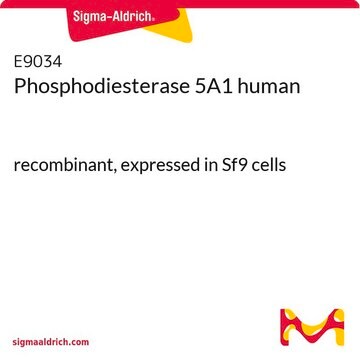G1642
sn-Glycerol-3-phosphocholine Phosphodiesterase from mold
lyophilized powder, ≥5 units/mg protein
Synonym(s):
Glycerophosphorylcholine phosphodiesterase from mold
Sign Into View Organizational & Contract Pricing
All Photos(1)
About This Item
CAS Number:
MDL number:
UNSPSC Code:
12352204
NACRES:
NA.54
Recommended Products
form
lyophilized powder
Quality Level
specific activity
≥5 units/mg protein
composition
Protein, ~40% Bradford
storage temp.
−20°C
Unit Definition
One unit will produce 1.0 μmole of choline from L-α-glycerophosphorylcholine, G4007, per min at pH 8.0 at 37 °C.
Physical form
Lyophilized powder containing Tris buffer salt
Storage Class Code
11 - Combustible Solids
WGK
WGK 3
Flash Point(F)
Not applicable
Flash Point(C)
Not applicable
Personal Protective Equipment
dust mask type N95 (US), Eyeshields, Gloves
Certificates of Analysis (COA)
Search for Certificates of Analysis (COA) by entering the products Lot/Batch Number. Lot and Batch Numbers can be found on a product’s label following the words ‘Lot’ or ‘Batch’.
Already Own This Product?
Find documentation for the products that you have recently purchased in the Document Library.
Mária Simocková et al.
The Journal of biological chemistry, 283(25), 17107-17115 (2008-04-25)
The product of the open reading frame YPL206c, Pgc1p, of the yeast Saccharomyces cerevisiae displays homology to bacterial and mammalian glycerophosphodiester phosphodiesterases. Deletion of PGC1 causes an accumulation of the anionic phospholipid, phosphatidylglycerol (PG), especially under conditions of inositol limitation.
Carmelina D Anfuso et al.
Lipids, 38(1), 45-52 (2003-04-03)
In pericytes from bovine retina, the enzyme glycerophosphocholine phosphodiesterase, catalyzing the hydrolysis of sn-glycero-3-phosphocholine to glycero-3-phosphate and choline, has been characterized with respect to pH optimum, metal ion dependence, Km, inhibitors, and subcellular localization. In these cells, the natural substrate
J P Galons et al.
Magnetic resonance in medicine, 33(3), 422-426 (1995-03-01)
The purpose of this study was to study the metabolic events during a slow acidosis in three different cell lines by combining 31P magnetic resonance spectroscopy and hollow fiber bioreactor technology. The rate of change in intracellular pH, glycerophosphorylcholine (GPC)
C D Anfuso et al.
Comparative biochemistry and physiology. Part B, Biochemistry & molecular biology, 112(3), 493-501 (1995-11-01)
While steady-state kinetic parameters (metabolite pools, Km and activation energies) are partially known for the enzymes involved in phosphatidylcholine synthesis and degradation in mammalian brain, they are not available for the nervous system of lower vertebrates or invertebrates. Since the
S Sipione et al.
FEBS letters, 384(1), 19-24 (1996-04-08)
In microvessels isolated from bovine brain, microsomal enzyme activities involved in phosphatidylcholine biosynthesis and degradation were determined. The microvessels possessed acyl-CoA:1-acyl-sn-glycero-3-phosphocholine (AT) and glycerophosphocholine phosphodiesterase (GroPChoPDE) activity at a higher level compared with bovine and rat brain or rat liver
Our team of scientists has experience in all areas of research including Life Science, Material Science, Chemical Synthesis, Chromatography, Analytical and many others.
Contact Technical Service








